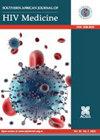西开普省一个农村和城市地区影响护士开具抗逆转录病毒治疗处方的信心和知识的因素
IF 1.6
4区 医学
Q4 INFECTIOUS DISEASES
引用次数: 7
摘要
背景自2010年南非引入护士启动和管理的抗逆转录病毒治疗(NIMART)以来,在初级保健中启动抗逆转录病毒疗法(ART)已成为护士的责任。这种方法能否持续成功取决于适当的培训和有效的支助系统等因素。目的本研究旨在调查影响西开普省农村和城市地区初级保健环境中专业护士管理人类免疫缺陷病毒(HIV)患者的知识和信心的因素。方法对来自29家医疗机构的77名接受NIMART培训的护士进行横断面调查,以测量人口统计学细节、影响因素、HIV管理信心和HIV管理知识。结果大多数参与者具有足够的艾滋病毒管理知识,并报告对艾滋病毒管理技能或能力非常有信心或专业。最近接受过当地指南(护理工具包实用方法)培训的参与者(3年前或更短时间)的知识得分明显更高。对诊所和个人表现的定期反馈与更高的艾滋病毒管理知识有关。与其他指导期相比,在2周内接受NIMART指导的参与者的平均信心得分更高。艾滋病毒感染者的病例数越高,知识和信心也越高。结论培训、指导和临床实践经验与知识和信心有关。建议包括加强当前的培训和指导,并确保NIMART培训的护士定期获得最新信息和足够的临床实践机会。本文章由计算机程序翻译,如有差异,请以英文原文为准。
Factors influencing the confidence and knowledge of nurses prescribing antiretroviral treatment in a rural and urban district in the Western Cape province
Background Since the introduction of nurse-initiated and managed antiretroviral treatment (NIMART) in South Africa in 2010, initiation of antiretroviral therapy (ART) in primary care has become the responsibility of nurses. The continued success of this approach is dependent on factors such as adequate training and effective support systems. Objectives This study aimed to investigate factors influencing the knowledge and confidence of professional nurses in managing patients living with human immunodeficiency virus (HIV) in primary healthcare settings in a rural and urban district in the Western Cape. Methods A cross-sectional survey was conducted amongst 77 NIMART-trained nurses from 29 healthcare facilities to measure demographic details, influencing factors, HIV management confidence and HIV management knowledge. Results The majority of participants had adequate HIV management knowledge and reported being very confident or expert in the HIV management skills or competencies. Participants trained recently on local guidelines (Practical Approach to Care Kit) (3 years ago or less) had significantly higher knowledge scores. Regular feedback about clinic and personal performance was associated with higher HIV management knowledge. Participants who received NIMART mentoring over a period of 2 weeks had a higher mean confidence score compared to other periods of mentoring. A higher caseload of patients living with HIV was also associated with higher knowledge and confidence. Conclusion Training, mentorship and clinical practice experience are associated with knowledge and confidence. Recommendations include the strengthening of current training and mentoring and ensuring that NIMART-trained nurses are provided with regular updates and sufficient opportunities for clinical practice.
求助全文
通过发布文献求助,成功后即可免费获取论文全文。
去求助
来源期刊
CiteScore
2.80
自引率
11.80%
发文量
41
审稿时长
>12 weeks
期刊介绍:
The Southern African Journal of HIV Medicine is focused on HIV/AIDS treatment, prevention and related topics relevant to clinical and public health practice. The purpose of the journal is to disseminate original research results and to support high-level learning related to HIV Medicine. It publishes original research articles, editorials, case reports/case series, reviews of state-of-the-art clinical practice, and correspondence.

 求助内容:
求助内容: 应助结果提醒方式:
应助结果提醒方式:


